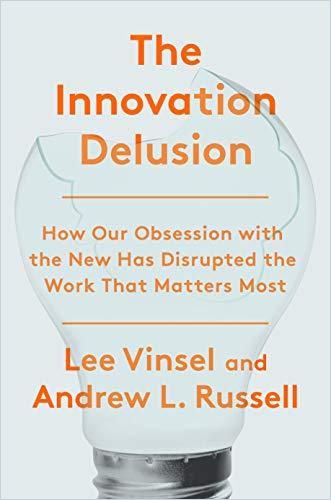Technology historians Lee Vinsel and Andrew L. Russell argue for nothing less than a grand shift of the American mind-set – away from adoring innovation toward repairing what Americans already own.

Fix It!
Technology historians Lee Vinsel – a professor in the Department of Science, Technology and Society at Virginia Tech – and Andrew L. Russell – a professor of history and dean of the College of Arts and Sciences at SUNY Polytechnic Institute – founded The Maintainers, a movement that subverts the idea that innovation can solve the world’s problems. They argue for the primacy of maintenance over innovation and seek to correct economic imbalances that flow from excessive compensation for the latter.
Publishers Weekly believes, “Readers will come away from [this] urgent and illuminating primer with a new perspective on the importance of maintenance as well as innovation…” Kirkus Reviews noted – in a starred review – that, “The authors … thoroughly expose the unjust hierarchy that leaves maintenance workers at the bottom of the pay scale.”
Terrible Advice
Vinsel and Russell lament that Facebook founder Mark Zuckerberg’s “Move fast and break things” became a widely accepted invitation to disrupt the status quo, even though it’s terrible advice. The authors argue that moving fast and failing often might work in software development, but has little relevance to people who make or provide, for example, roads, health care or maintenance of infrastructure.
[M]any people assume that innovation itself is a good, when in fact it can never be more than a means to an end.Lee Vinsel and Andrew L. Russell
Vinsel and Russell posit that true innovation combines new or existing knowledge, technology and resources to drive change and create profit and, thus, today’s innovation-speak equals a sales pitch for a future that doesn’t exist.
The authors’ core position is that the American fascination with novelty impedes its capacity to maintain and care for what it already has. Accordingly, they believe everyone needs access to basic infrastructure – roads, clean water, health care – and that workers who maintain society should be compensated properly. Vinsel and Russell detail how people in charge of infrastructure often defer maintenance, allowing infrastructure to crumble, which exacts a high cost.
Goals
Vinsel and Russell point out that in your home, the oldest technologies are walls, glass windows, carpets, sinks and toilets. The newest are digital TVs, computers, or an Amazon Echo or Google Home. They ask, simply: Which could you live without?
Technology (as an object) isn’t merely digital and new; and technology (as a process) isn’t merely innovation.Lee Vinsel and Andrew L. Russell
The authors prefer to view technology as how people engage with physical reality and they cite its three phases: innovation, maintenance and decay. They tell how urbanization and industrial capitalism spurred investments in railroads, steel plants, refineries; maintenance labor became essential. As radios, refrigerators, washing machines and automobiles became affordable, Vinsel and Russell explain that a cadre of specialized maintenance workers evolved to care for these technologies.
Neglecting Maintenance
The authors cite how mass transit, dams, levees and drinking water all suffer neglect that fuels a slow disaster in US infrastructure.
The Innovation Delusion degrades our societal infrastructure, undermines its public and private institutions, and harms our health.Lee Vinsel and Andrew L. Russell
Vinsel and Russell disclose that the US government allocates spending on new infrastructure but little on maintaining it. Because tax revenues prove insufficient to the task, the authors reveal, new infrastructure burdens future generations. They track how suburbanization demanded expensive infrastructure, which federal agencies and developers paid for but left maintenance to municipalities. Vinsel and Russell explore rural communities with unreliable electricity and rudimentary plumbing. This leads them to ask: Should functional infrastructure be a human right?
In some cases, the goal should be selective and graceful degrowth – paring back our infrastructural burden and getting smaller.Lee Vinsel and Andrew L. Russell
The challenge, the authors concede, is determining what needs the most attention first. Faced with repairing infrastructure, many cities could go deeply into debt or declare bankruptcy.
Dirty Work
Construction, tile and marble setting, electrical installation and transportation equipment repair, Vinsel and Russell recount, need specialized workers, and pay well.
To value care work…is an essential step toward moving past a culture of narcissistic materialism.Lee Vinsel and Andrew L. Russell
The authors position is simple and clear: Maintenance professions deserve more respect and recognition. Registered nurses, for example, will be in high demand as the US health care system expands and, Vinsel and Russell recognize, the population ages. A shortage of nurses, the authors maintain, derives from a lack of recognition and that they burn out quickly. To change this trend, Vinsel and Russell demand, employers must stop grinding all the productivity out of workers, and workers must support each other.
The Maintenance Mind-set
Vinsel and Russell remind you that things are repairable. They note that the internet and companies like iFixit provide manuals and solutions to fix pretty much anything. They revile that Apple, for example, voids warranties if consumers bypass its profitable repair department. The authors highlight the right-to-repair movement’s championing of sustainability.
How do we change our culture to value maintenance and focus on it so that we stop getting into the same messes?Lee Vinsel and Andrew L. Russell
Vinsel and Russell ask: What if people cared for their things, their communities and themselves, in thoughtful, meaningful ways? They believe that existential questions about climate change and environmental degradation hinge on humans’ capacity to maintain what matters most. Living responsibly and sustainably benefits everyone, the authors fervently believe.
Heartfelt Convictions
Vinsel and Russell offer neither – superficial appearances to the contrary – a polemic or a manifesto. Instead, they present a heartfelt, almost homespun, plea for greater community, lesser focus on immediate profit and more concern for problems that may not manifest for decades. To say the least, this plea runs opposite to the more prevalent contemporary American values. Vinsel and Russell sometimes strain to find the best examples to illustrate their case, but their direct voice and sincerity underscore the vital urgency of the coming American infrastructure collapse; the authors provide workable solutions and attitudes, if anyone will heed their call.
Lee Vinsel also authored Does America Need More Innovators? and Moving Violations. Andrew L. Russell’s books include Open Standards and the Digital Age and Ada’s Legacy.




